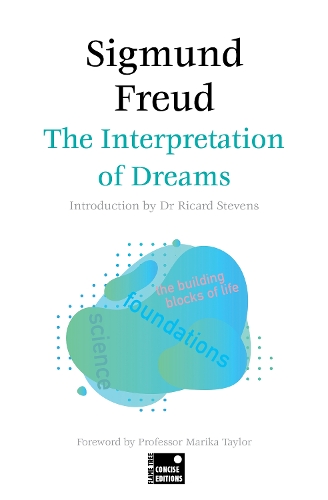
The Interpretation of Dreams (Concise Edition)
(Paperback)
Publishing Details
The Interpretation of Dreams (Concise Edition)
By (Author) Sigmund Freud
Introduction by Professor Richard Stevens
Foreword by Professor Marika Taylor
Flame Tree Publishing
Flame Tree Publishing
16th April 2024
16th April 2024
United Kingdom
Classifications
General
Non Fiction
Psychology: states of consciousness
History of science
Popular science
154.63
Physical Properties
Paperback
256
Width 130mm, Height 198mm, Spine 17mm
176g
Description
Freud's seminal work helped shaped the cultural landscape of the world today. Now in a digestible, pocket format for the modern reader. The Interpretation of Dreams is an essential work of psychological and cultural heritage and probably the most important of Freud's impressive output. Published in 1899 but revised by Freud himself many times, it outlines his theories on the unconscious and dream symbolism. Though largely superseded by subsequent developments and research, it retains its place as a hugely influential and significant opus. This new compact, abridged edition uses A.A. Brill's 1913 translation of the third edition, with an introduction by expert Dr Richard Stevens, who discusses the context, reception, influence, importance and merits or otherwise of Freud's text and Brill's translation. AUTHOR: Sigmund Freud (18561939) set up in private clinical practice in treating 'nervous disorders' and would go on to develop techniques associated with psychoanalysis, as well as his famous theories on the unconscious, the human psyche, dreams and sexuality leading to influential works such as The Interpretation of Dreams and The Ego and the Id.
Author Bio
Sigmund Freud(18561939), the famously influential neurologist and founder of psychoanalysis,was born in a small town in what is now the Czech Republic. In 1886 he set up in private clinical practice in treating nervous disorders and would go on to develop the various techniques associated with psychoanalysis, as well as his famous theories on the unconscious, the human psyche, dreams and sexuality leading to the publication of many works, of whichThe Interpretation of Dreams(1899) andThe Ego and the Id(1923) are just a two examples.
Professor Richard Stevens (Introduction and abridgement) was previously Head of Psychology at the Open University. He holds a first-class degree in Psychology from the University of Edinburgh as well as an MA (Trinity College Dublin) and a PhD by published work. He has been Chair of the Association for Humanistic Psychology in Britain and helped to found the Consciousness and Experiential Section of the British Psychological Society. His books include Freud and Psychoanalysis and Understanding the Self and he has numerous publications in academic and other journals.
Professor Marika Taylor (Series Foreword) is a Professor of Theoretical Physics and Head of School within Mathematical Sciences at the University of Southampton. Her research interests include all aspects of string theory, gravitational physics and quantum field theory. In recent years much of her work has been focused on holographic dualities and their implications. Marika's research has featured in such publications as Physical Review, Journal of High Energy Physics and General Relativity and Gravitation among others.
